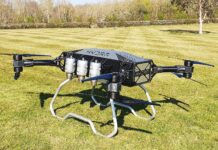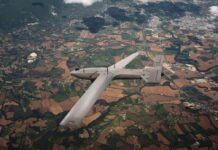UK security technology company OSL announced on 2 April 2025 the successful completion of the final phase of Project HADO (High-Intensity Autonomous Drone Operations): a UK Research and Innovation-funded research and development initiative aimed at enabling secure, repeatable beyond-visual-line-of-sight (BVLOS) unmanned aerial vehicle (UAV) operations across UK airspace.
The milestone marks the conclusion of more than two years of intensive innovation, consortium collaboration and field testing. OSL led a consortium working on the project as prime integrator, bringing together key organisations including Heathrow Airport, Thales, Cranfield University, UAVTEK, Carmenta, HeroTech8, and Dynamic Intelligence Solutions, with each organisation contributing critical expertise across aviation, autonomy, surveillance, and airspace management.
Project HADO focuses on enabling fully autonomous UAV missions in busy, safety-critical environments such as around airports, ports, urban centres and transport hubs: spaces where complex air and ground activity makes uncrewed flight especially challenging. While many BVLOS projects explore long-range corridor travel, HADO was designed to address the far more difficult task of operating autonomously within high-density, operationally complex areas.
In the final series of live trials, OSL deployed its system within the Heathrow Flight Restriction Zone (FRZ), demonstrating two core use cases: perimeter patrol, using visible and thermal cameras to detect loiterers or intrusions along a fence line; and building survey, using automated point-to-point flight and image capture to generate both visual and thermal inspection data.
These missions were supported by a detailed digital twin of the environment, developed in collaboration with Cranfield University. This synthetic modelling environment enabled precise flight planning, environmental awareness and robust training of the autonomous behaviours required for safe and repeatable operations.
The system is fully integrated into OSL’s proprietary platform, FACE, which incorporates ‘drone-in-a-box’ infrastructure, layered sensor fusion, uncrewed traffic management (UTM) tools, and a real-time operator interface. This end-to-end capability allows for safe, automated missions even in GPS-denied or dynamically changing environments.
One of the outcomes of the project’s final phase is the development of a rapidly deployable mobile HADO system, allowing organisations to set up autonomous UAV operations on-site within a single day. This flexibility opens the door to a wide range of applications, from critical infrastructure inspection to urban safety and emergency response, OSL noted.
The project also delivered significant advances in detect-and-avoid functionality: widely considered one of the key challenges to safe BVLOS flight. By combining radar, optical sensors and real-time environmental scanning with AI-driven logic, the system can autonomously detect risks, adjust its flight path, or safely return to base.
OSL continues to work closely with the UK Civil Aviation Authority (CAA) to support the safe expansion of BVLOS UAV operations in the UK. The comprehensive safety framework, operational data and successful trials at OSL’s test facility near Reading are helping to inform the evolution of the UK’s regulatory environment.
Looking ahead, the technologies developed in HADO are intended to support a wide range of civil and commercial use cases beyond the security domain — including infrastructure monitoring, transport hub management, and smart city applications. OSL and its partners are actively exploring future opportunities to deploy and evolve the system in line with operational needs.
“Project HADO has been a defining moment for OSL,” Mark Legh-Smith, the company’s CEO, was quoted as saying in a company press release. “We’ve taken a bold vision and delivered a functioning, field-tested system that brings together autonomy, safety, and situational awareness. It’s a milestone not just for our team, but for the future of UK airspace.”







![Trade-offs in air defence system design A Shahed 136 OWA UAV on display. Iran’s decision to add such threats into the mix for its April 2024 attacks proved less effective than it might have hoped. This was partially due to their launch increasing the warning time, but also because the air defence means to deal with Shahed tend to be much simpler than those required to deal with ballistic missiles, meaning there was no real synergy between the two to overwhelming a particular class of defensive system. [FARS Media Corporation/Behrouz Ahmadi, via Wikimedia Commons (CC-BY-4.0)]](https://euro-sd.com/wp-content/uploads/2025/08/Shahed_FARS-Media-CorporationBehrouz-Ahmadi-via-Wikimedia-Commons-CC-BY-4-218x150.jpg)
![Developments in strike UAVs The Flyby Jackal launches an LMM during testing. [Crown Copyright 2023]](https://euro-sd.com/wp-content/uploads/2025/07/Jackal_Crown-Copyright-Kopie-218x150.jpg)





